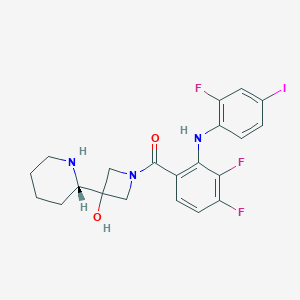| 1 |
Recurrent recessive mutation in deoxyguanosine kinase causes idiopathic noncirrhotic portal hypertension.Hepatology. 2016 Jun;63(6):1977-86. doi: 10.1002/hep.28499. Epub 2016 Mar 31.
|
| 2 |
URL: http://www.guidetopharmacology.org Nucleic Acids Res. 2015 Oct 12. pii: gkv1037. The IUPHAR/BPS Guide to PHARMACOLOGY in 2016: towards curated quantitative interactions between 1300 protein targets and 6000 ligands. (Ligand id: 5196).
|
| 3 |
Clinical pipeline report, company report or official report of the Pharmaceutical Research and Manufacturers of America (PhRMA)
|
| 4 |
Clinical pipeline report, company report or official report of the Pharmaceutical Research and Manufacturers of America (PhRMA)
|
| 5 |
ClinicalTrials.gov (NCT01106599) A Study Evaluating the Safety, Tolerability, and Pharmacokinetics of GDC-0623 in Patients With Locally Advanced or Metastatic Solid Tumors. U.S. National Institutes of Health.
|
| 6 |
Characterization of an Akt kinase inhibitor with potent pharmacodynamic and antitumor activity.Cancer Res.2008 Apr 1;68(7):2366-74.
|
| 7 |
Xanthohumol inhibits non-small cell lung cancer by activating PUMA-mediated apoptosis. Toxicology. 2022 Mar 30;470:153141. doi: 10.1016/j.tox.2022.153141. Epub 2022 Mar 5.
|
| 8 |
PI3K/AKT inhibitors aggravate death receptor-mediated hepatocyte apoptosis and liver injury. Toxicol Appl Pharmacol. 2019 Oct 15;381:114729. doi: 10.1016/j.taap.2019.114729. Epub 2019 Aug 22.
|
| 9 |
Modulation of Akt/mTOR signaling overcomes sunitinib resistance in renal and prostate cancer cells. Mol Cancer Ther. 2012 Jul;11(7):1510-7. doi: 10.1158/1535-7163.MCT-11-0907. Epub 2012 Apr 24.
|
| 10 |
Combined SRPK and AKT pharmacological inhibition is synergistic in T-cell acute lymphoblastic leukemia cells. Toxicol In Vitro. 2020 Jun;65:104777. doi: 10.1016/j.tiv.2020.104777. Epub 2020 Jan 18.
|
|
|
|
|
|
|


